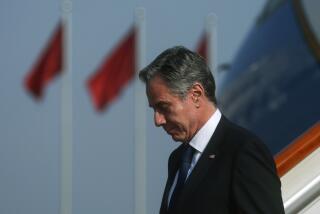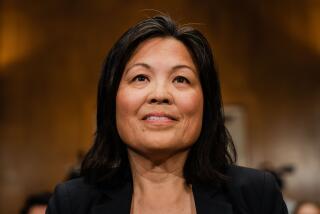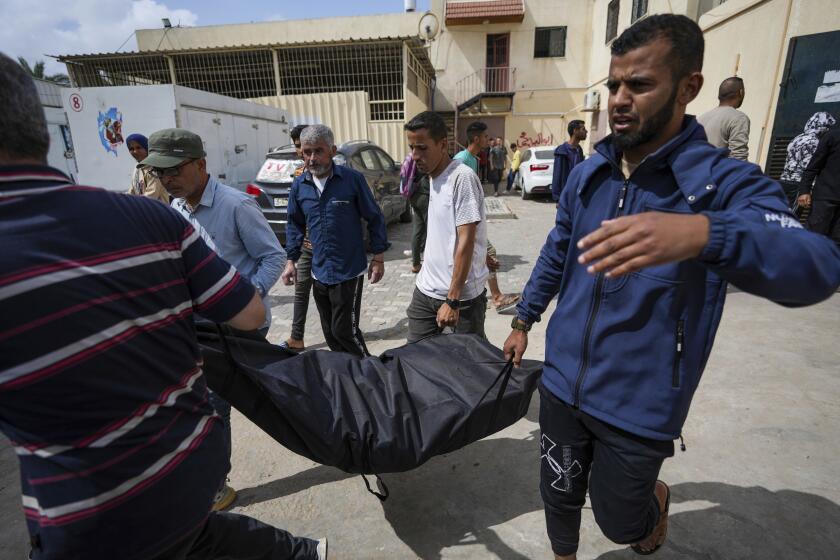Mike Pompeo, Trump’s pick for top diplomat, to face Senate confirmation hearing as international crises mount
Mike Pompeo faces his Senate confirmation hearing Thursday to become secretary of State as the Trump administration grapples with a mounting series of international crises and challenges, including probable U.S. air raids in Syria, a likely withdrawal from the Iran nuclear deal, and a possible summit with North Korea.
If confirmed, the CIA director and Republican former member of Congress will take over a State Department that has been badly depleted by senior staff departures and a shrinking budget under President Trump.
Pompeo’s confirmation isn’t assured. The Senate Foreign Relations Committee has a one-vote Republican majority — and one Republican, Sen. Rand Paul of Kentucky, already has announced his opposition.
If Pompeo does not gain any Democrats’ votes, the committee likely will pass his nomination “without recommendation” to the full Senate for a vote. That would prove embarrassing but not necessarily fatal since Pompeo has allies in Congress.
In many ways, the confirmation battle is shaping up as a congressional referendum on Trump’s mercurial foreign policy, rather than on Pompeo’s diplomatic skills. Pompeo’s odds weren’t helped when Trump chose John Bolton, an arch-conservative, as his national security advisor. Bolton took office Monday.
Pompeo has courted committee Democrats and other senators in closed-door meetings. At least in public, most senators remained noncommittal.
“This was a valuable opportunity to hear his views on the diplomatic challenges facing our country around the globe,” Sen. Jeanne Shaheen (D-N.H.), a member of the committee. “I look forward to asking him more questions during his confirmation hearing.”
Pompeo also reached out to former secretaries of State, including Hillary Clinton and John F. Kerry, whom he railed against when they served under President Obama.
Pompeo, a member of Congress from Kansas for six years until January 2017, when Trump tapped him for the CIA, is seen as more hawkish on international issues than his predecessor, Rex Tillerson, whom Trump fired last month.
While in Congress, he strongly opposed the 2015 deal to limit Iran’s nuclear weapons capability, and he is expected to back Trump’s vows to withdraw from the international accord as soon as next month.
Pompeo struck a more diplomatic position on Capitol Hill, however.
Sen. Benjamin L. Cardin (D-Md.), a member of the committee, said Pompeo told him he preferred to “fix not nix” the agreement, but was prepared to withdraw from it.
Cardin voted against Pompeo as CIA director last year. But even some Democrats who backed Pompeo then appeared reluctant this time.
Sen. Tim Kaine (D-Va.), another committee member, voted for Pompeo last year, for example, but said he now has concerns that Pompeo would resort to military action over diplomatic negotiation.
“I just want to understand his temperament,” Kaine said.
Sen. Paul, the only Republican to vote against Pompeo for CIA director, said he will oppose him again because of Pompeo’s defense, while in Congress, of the CIA’s use of harsh interrogation methods that critics called torture.
Pompeo, 54, was born in Orange, Calif., and graduated from the West Point. He served as an Army officer before he moved to Wichita, Kan., and began working in the defense industry business — and then politics.
Unlike many in the Cabinet, Pompeo has stayed in Trump’s good graces. When the president nominated Pompeo, he emphasized the bonds they share, saying they were “always on the same wave length.”
If confirmed, Pompeo will need to remain in Trump’s favor while also building a constituency at the State Department, where foreign policy veterans have quit or retired in droves rather than carry out Trump’s policies.
The Senate committee is likely to grill Pompeo about past comments that activists regard as offensive to Muslims and gay people. They include Pompeo’s comments to an evangelical church group in 2014 when he called the fight against terrorism a holy war in which Christianity “is truly the only solution for our world.”
The Anti-Defamation League has documented Pompeo’s association with anti-Muslim organizations and has criticized his opposition to same-sex marriage. He called the Supreme Court decision on marriage equality a “shocking abuse of power” that he would not cease to fight against.
The ADL, in a letter, urged the Senate Foreign Relations Committee to give intense scrutiny to Pompeo’s views and “rigorously” question his ability to represent “the highest American human rights values abroad.”
The Council on American-Islamic Relations and several liberal groups, including the pro-Israel J Street lobbyists, called for senators to oppose Pompeo. They’ve staged petitions drives and other demonstrations to push the point.
If he is confirmed, Pompeo will have a full agenda. Trump is expected to authorize a military attack on Syria in coming days. He has vowed to withdraw from the Iran deal on May 12 unless it is revised. And he plans to meet North Korean leader Kim Jung Un in late May or early June to discuss the nuclear impasse with Pyongyang.
Pompeo has gotten briefings at the State Department. But there, too, he is working at a disadvantage.
As of March 23, only two of seven under-secretary of State positions and 14 of 22 assistant secretary of State posts had been nominated or confirmed, according to the U.S. Global Leadership Coalition, a foreign-policy advocacy group that tracks administration appointments.
In addition, 37 ambassador posts remain open without nominations, including hot spots such as South Korea, Turkey and Jordan.
For more on international affairs, follow @TracyKWilkinson on Twitter
More to Read
Start your day right
Sign up for Essential California for news, features and recommendations from the L.A. Times and beyond in your inbox six days a week.
You may occasionally receive promotional content from the Los Angeles Times.






